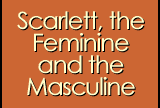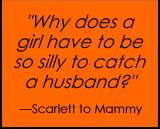Unfortunately for Rhett, he accepts Scarlett's terms and embarks upon his own lost cause. His loving commitment to her is truly a "fatal attraction" because he is simultaneously drawn both to those qualities in her he cannot conquer and to the idea of conquering them. Further, if those qualities are male then the enterprise becomes as much a contest between masculinities as between male and female, perhaps rendering victory all the more essential to Rhett. While he repeatedly and successfully uses force, his real aim is Scarlett's willing and total submission. Indeed what Rhett wants--even specifies in his departing monologue--is a "little girl" like deceased daughter Bonnie, whom he can "pet" and "spoil." The comparison is meaningful, for his speech reveals that no difference exists in his mind between the husband-wife and father-daughter relation, the key dynamic of which is again male control and female powerlessness. 
The confusion of gender identity and roles within the character of Scarlett has generated commentary on the novel also. Both Anne Edwards and Elizabeth Fox-Genovese, for example, have noted parallels between Margaret Mitchell and Scarlett in apparent sexual/gender "confusion."NOTE 11 Fox-Genovese stated that such "ambivalence" reaches "schizophrenic proportions" in Mitchell's "play with transsexual identifications."NOTE 12 In addition, both writers have linked this confusion to Mitchell's era (b. 1900) and the phenomenon of the "new woman" of her adulthood.NOTE 13
Conspicuously absent in the critical literature, however, is specific reference to homosexuality, itself a relatively new concept in the age of the "New Woman." Am I trying to bring Scarlett (and/or Mitchell) into the lesbian fold? Yes and no. "Lesbian," we are discovering, is a complicated word and as dependent for its meaning on the complex interactions of cultural structures, institutions, and attitudes as on simplistic notions of who seems to desire whom. Christina Simmons, for example, examined the "fear of lesbianism" in the 1920s and 1930s (Mitchell's era, it should be noted) and assigned a symbolic as well as literal (sexual) meaning to the lesbian identity: " . . . lesbianism represented women's autonomy in various forms--feminism, careers, refusal to marry, failure to adjust to marital sexuality."NOTE 14 Scarlett, of course, thinks she loves and desires men (Ashley, Rhett) though at times she appears incapable of loving anyone but herself. Here the options available to a woman of her time, place, and personality must be considered. When she does not respond positively to Melanie's affection (as when Melanie calls them "two sisters"), Scarlett denies herself a potential intimate friendship and in so doing leaves herself the choices of either heterosexual marriage or standing alone--the perennial dichotomy in a heterosexist society. At film's end, Scarlett is alone, all her marriages having failed (the others were loveless and passionless, after all). If viewers sympathetic to such sisterhood could set aside the myth, they might hope that Scarlett would set her sights on female companionship rather than on Rhett's. But this, of course, cannot be: as a representation of female autonomy, a lesbian in the political sense only, she is problematic enough for her audiences.NOTE 15





